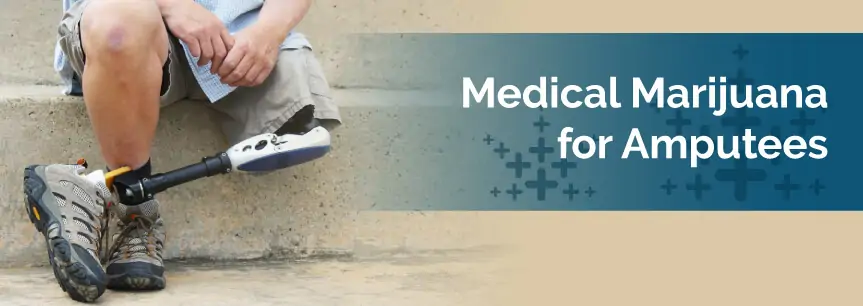
Though modern medical techniques have improved amputee surgery survival rates, it’s still a last-resort treatment for several different conditions. The number of amputees has increased because of combat and other situations, including advancing cancers and trauma due to accidents.
Amputation is a life-saving technique, but it often leaves patients with chronic health issues. Limb amputation can affect regular daily activities and require occupational therapy to become independently functional again. Amputation also changes the circulatory and nervous systems.
The dominant issues concerning people after a limb amputation are pain and anxiety. Both can be treated very effectively with medical cannabis products.
It’s not uncommon to experience pain in the remaining portion of your limb after an amputation. In some cases, this pain resolves with time. In others, it’s permanent.
At least 67% of people with an amputated limb experience residual limb pain (RLP), which is different than phantom limb pain. Phantom limb pain is a psychological condition where the amputee feels pain in the part of the limb that no longer exists. RLP is felt in the existing part of the limb near where the amputation took place.
RLP can be caused by factors that existed before the amputation, or it can be the result of the amputation surgery.
The causes of RLP include:
RLP can be extremely painful — it may feel like a cramping or aching in the area surrounding the end of the amputation. RLP could also be a hot or cold sensation or a burning feeling in the region. In some cases, another surgery is required to resolve RLP. Sometimes it’s just a temporary condition during healing.
Over time, an amputated limb may result in muscle atrophy or loss of bone density. In amputated legs, the lack of weight-bearing weakens the remaining bone and the person’s altered step changes the way their muscles are used. The muscles that are no longer used for walking can lose strength and shrink in size.
These changes in an amputated limb can result in pain. Amputees often live with chronic pain because of the amputation. Chronic pain is its own condition and can lead to anxiety or depression.
Another chronic condition that can develop after amputation is anxiety or depression. When the shape of your body is severely altered, especially when it no longer looks like most other bodies, the change can be mentally jarring. Amputation also changes your ability to perform daily tasks, which can affect your outlook on life.
The reason for your amputation can also be a source of stress. Traumatic accidents can result in post-traumatic stress disorder (PTSD), a serious mental health issue. Your amputated limb can be a permanent reminder of the trauma that brings back strong emotions that are difficult to process. People with PTSD experience anxiety and depression along with insomnia, flashbacks and panic attacks.
Even amputations that aren’t a result of trauma can be equally as stressful. Cancer amputations often lead to anxiety over the cancer returning and anger about cancer in general. Diabetics sometimes require amputation because of poor blood circulation. That amputation can represent the progression of their disease and force them to struggle with their mortality.
Living without a limb is extremely stressful and exhausting, especially in the beginning. Amputees work harder to perform daily tasks the rest of us consider routine. They must monitor their health closely and may choose to use a prosthetic device that requires routine refitting. Anxiety is not unusual for amputees.
Cannabis is a proven pain reliever that doesn’t have any of the negative side effects that opioids do. It can also treat nerve pain that’s extremely difficult to alleviate otherwise. Much of the RLP associated with amputations is nerve pain and can be chronic, which makes medical marijuana the perfect treatment.
Marijuana therapy can relieve RLP without addiction or dangerous side effects. An overdose of opioids can be fatal because it suppresses the respiratory system. Cannabis blocks nerve pain but doesn’t affect heart rate or respiration. It’s not physically possible to overdose on marijuana, in any form.
Cannabis products can be used topically on localized pain such as RLP. Marijuana-infused oils and lotions are available that can be applied directly to the area where it hurts. The benefit of topical applications is almost immediate relief from pain. The cannabinoids work directly with the nerve in the region and never travel to the brain.
Topical medical marijuana applications are good for relieving pain without inducing any psychoactive properties. You can use a topical cannabis product while at work or during any physical activity. It will not produce a high, impair judgment or induce sleep.
Cannabis is also useful in treating anxiety and depression. The euphoric effect of marijuana is relaxing and can be sustained longer than with other medications. There’s also no big drop in mood when the cannabis wears off, either, that might spike feelings of depression.
There are several different ways to administer medical marijuana for the relief of anxiety. A few drops of a tincture or other cannabis concentrate taken sublingually can counteract an acute anxiety attack almost instantly. More long-acting forms of marijuana can be used for long-term stress management.
Marijuana therapy may be used in conjunction with other therapeutic techniques to treat PTSD. Managing the symptoms of PTSD that may accompany amputation, cannabis can help work through the extreme emotions of PTSD safely.
Learn More
To learn more about the uses of medical marijuana for amputees, talk to a marijuana doctor in your area.
No Information on MarijuanaDoctors.Com should be used to diagnose, treat, prevent or cure any disease or condition. You can view our Full Disclaimer here.